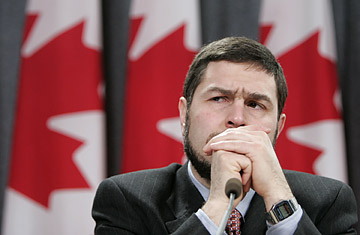
On Dec. 9, a court will hear oral arguments in the case of Maher Arar, a Canadian citizen whom U.S. authorities seized at New York's J.F.K. airport in September 2002 and then sent to Syria
In recent years the Justice Department has rarely drawn kind words from Senate Judiciary Committee chairman Patrick Leahy, who has aggressively sought key Bush Administration memos related to anti-terrorism policies. But the Vermont Democrat and strident White House critic offered measured praise this week when the Justice Department agreed to hand over a series of documents Leahy hopes will shed light on some of the more shadowy policies crafted by the Bush Administration. "This is a good start," Leahy said, adding that he was certain many more closely guarded Justice Department documents would be coming his way when the new Administration takes office in January.
The Senate Judiciary Committee inquiry is just one of many legal challenges the Bush White House is facing during its final days in office. The Administration's terrorism policies and legal actions are also being examined with skeptical eyes in federal courts, on Capitol Hill and in ethics offices of the Justice Department itself. Many civil rights activists are hoping that more challenges will follow once President-elect Barack Obama takes office in January. (See pictures of how Obama's election energized the heart of the civil rights movement.)
Even with President Bush still in office, at least three internal government probes examining legal decisions by the White House are unfolding. Since December 2007, federal prosecutors, FBI agents and the internal watchdog office at the CIA have been investigating whether any laws were broken in 2005, when the CIA destroyed videotapes showing harsh interrogations of detainees. Separately, the Justice Department's internal Office of Professional Responsibility is investigating whether the department's legal approval of waterboarding and other so-called enhanced interrogation methods was appropriate. The same office is conducting a similar investigation into legal decisions made by Bush Administration officials authorizing domestic surveillance, an issue at the center of a court case as well. (See the top 10 unfortunate political one-liners.)
Other legal proceedings against the Bush Administration are starting up. A federal judge in Washington this month ordered the White House to turn over a series of legal memos written to justify electronic eavesdropping without a warrant in a case brought against the Administration by the American Civil Liberties Union and other rights groups. According to the ruling, the judge will review the memos to determine whether any information can be released publicly under the Freedom of Information Act, despite objections from the Justice Department, which is citing attorney-client privilege and national security concerns for refusing to divulge the contents.
In August, the Second Circuit Court of Appeals in New York made the unusual move of revisiting a previously decided case challenging the Bush Administration's practice of extraordinary rendition, in which U.S. authorities hand certain terrorist suspects to outside countries for interrogation. On Dec. 9, the court will hear oral arguments in the case of Maher Arar, a Canadian citizen whom U.S. authorities seized at New York's J.F.K. airport in September 2002 and then sent to Syria, where Arar claims he was tortured before being released without charge. Previously, the U.S. District Court for the Eastern District of New York dismissed Arar's case, essentially ruling that national security concerns outweighed any claims of civil rights violations.
Meanwhile, in early October, another federal court ruling ordered the Bush Administration to release 17 Muslim detainees (who are of Uighur ethnicity but citizens of China) held at Guantánamo Bay, Cuba. It was one of the strongest judicial challenges yet to the Administration's claim of executive authority to bypass U.S. courts to hold and try suspected terrorists in special tribunals. The Justice Department has so far successfully resisted that order, and the case remains unresolved. Since the ruling, the Bush Administration has been working to find a country willing to accept the Uighurs, who cannot be handed to China under U.S. law since Beijing considers them separatists and may mistreat them. Hundreds of legal challenges to Guantánamo detentions are working their way up through the courts in the wake of a ruling in June by the Supreme Court, which said the prisoners there can have their cases heard in the U.S. legal system.
Many civil rights activists hope that the legal efforts will eventually lead to the prosecution of outgoing Administration officials for various offenses allegedly committed in the name of fighting terrorism over the past eight years. So far Obama and key congressional Democrats have signaled little interest in investigating and prosecuting Bush Administration officials once they leave office, a position some fear could leave the way open to similar government abuses in the future. "How do you deter these types of crimes in the future?" asks Vincent Warren, executive director of the Center for Constitutional Rights. "There is no meaningful way to deter subsequent Administrations from engaging in the thought process and the activities that this Administration did without a serious threat of criminal prosecution. The other ways of doing that, which would be having the Congress and the courts be a check on Administration policies, have failed miserably."
